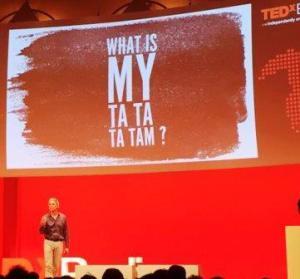Tuesday afternoon was the TEDxBerlinSalon – a series of inspiring talks on the topic of Leading in a Complex World. I didn’t want to go; I was feeling blue, the Bavarian had been annoying me, the days were getting colder and darker.
Besides, why was I attending a conference on leadership? I am not a leader. I have no interest in leading people. People are idiots. But I had my ticket and had planned to blog about it, so I decided to go Gonzo. Think An English Man in Berlin on PMS instead of Hunter S Thompson on acid…

Karboul talked about how some companies – Nokia, Yahoo, Kodak – fly into the ‘coffin corner’ due to ‘railroad thinking.’ Yeah, her metaphors were all over the place. To complete her bag of images, she threw a pomegranate into the mix. Companies, she said, should be structured like pomegranates if they want to keep their edge. Despite myself, I actually liked the idea. Mostly, because it confirmed my position in a recent disagreement I had with The Bavarian, who thinks my way of moving between different things – blogging, fiction-writing, an up-coming venture into podcasting – is chaotic.
“Hah!” I argued with him in my head, “It’s the latest in pomegranate-thinking; having no core, but many separate yet connected seeds. And it’s high in vitamin-CI!”
The audience clapped. I almost stood up and bowed.
The next talk gave me more ammunition in my imaginary argument with the Bavarian. Director of the School of Design Thinking Ulrich Weinberg talked about the end of ‘Brockhaus Thinking’. Brockhaus is the German encyclopedia that recently discontinued after 200 years – having even missed the opportunity to go digital. Weinberg’s point was that our companies and education systems must reflect the ever-growing complexity of our world by transforming from ‘linear’ to ‘network’ thinking.’ This comprises 3 core elements:
- Working in multidisciplinary teams
- Having an iterative, rather than linear process
- Working in variable physical spaces
Bosch, for example, recently changed its model from individual to group incentives for its entire 300,000 strong workforce, encouraging collaboration rather than competition within the company. Weinberg argued that even university theses should be done in groups. Oh god. I completely forgot my argument with the Bavarian as a dystopian vision of the future – similar to Dave Eggers’ The Circle – opened up before me; constant connection, team activities, no space for the individual.
The man sitting in front of me clapped loudly, heralding in this new era defined by the shape of technology. I hate loud clappers. I wanted to find a cabin where I could curl up and flick through dusty pages of Brockhaus encyclopedias, alone.
Thank god for Janina Kugel, member of the Managing Board of Siemens, whose grounded and substantial talk on the power of being different served as an antidote. She spoke about her experiences as a woman of color in Germany, and how exclusion and being different produces good leaders because it a) helps you to look beyond the obvious, b) teaches you how to fight for your position and point of view and c) gives you the skills to understand and adapt to different group dynamics and people. By the time she finished, my mood had settled at a tranquil turquoise.
Next, Hermann Arnold introduced himself as a former CEO, who had stepped down. Great. This was my kind of guy. Modest. Of course, he went to India after quitting, but he admitted to the cliche. Nice. Not only did he step down, he had a downbeat sense of humor. Arnold claimed that stepping down could be educational, and create better leaders. Society and the ego’s expectations of always climbing the career ladder and staying on top could be damaging. Instead, moving in spirals (and here we circle back to round structures, like pomegranates), where you learn, then step up and instruct, then step down again to mentor and let someone else take your place is more beneficial leadership pattern.
Serial entrepreneur Waldemar Zeiler stepped onto stage next, but I didn’t listen to him because he had a ridiculous beard.
Despite this, my mood was somewhat lifted. This might have been the result of cheap tricks like being offered chocolate cake during the break, and doing breathing exercises with Patricia Thielemann of Spirit Yoga.
However Ratna Omdivar made me forget my moodiness altogether when she recounted the story of how she suddenly became a refugee. Leadership for her requires key qualities of resistance, renewal and flexibility. Most important, however, is compassion. As well as being vital to leadership in complex times (just look at the complexity of the refugee crisis Germany is facing today), Harvard University research has shown that compassion is good for you; it makes live longer, appear more attractive to your partner, and feel better. And it did – hearing Omdivar’s story took me out of myself and connect with her and my fellow humans.
The next speakers continued this positive surge: activist Yörük Kurtaran talked about the Gezi protests in Istanbul, Regina von Flemming recounted the tough challenges she faced as Publisher and CEO for Axel Springer Russia, and Nuhu Ribadu spoke about his fight against corruption in Nigeria. Ribadu not only took on international companies and politicians despite being stonewalled, bribed and threatened, but even ended up arresting his own boss. He received a standing ovation. These were fascinating people who had survived difficult situations and continued to do good work. I was a warm, inflamed orange.

With the help of a string quartet, he demonstrated why Beethoven’s 5th Symphony so powerful: Repetition. Apparently – and I guess he’s counted – the ‘ta-ta-ta-tam’ motif is repeated 176 times in the piece. His question to us all was, What is your ta-ta-ta-tam? By this, he meant, what thoughts were we filling our minds with? Negative s***? Ideas? Questions? Love?
This was profound for me in a few ways. Firstly, as a wonderful insight into how art works – through repetition and variation of motif. I may have been attending a conference on leadership, but I was getting a lesson in composition. Secondly, it made me reassert my control over my thoughts and my mood. And lastly it made me re-focus my energy on what my ta-ta-ta-tam was in life.
By the time I walked out of the TEDxBerlinSalon, I was humming Beethoven’s 5th symphony, burning red.
Filed under: Life in Berlin
